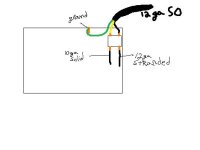patrick_g
Elite Member
When in doubt hire an electrician. Pat has said it about as clear as anybody. I've been in electronics/electrical work for most of my life and it never ceases to amaze me when anybody has an electrical discussion. My 2 cents are Power (watts) are capacity generated or used. Volts and amps are the medium used to get the job done. If your welder requires 50amps at 240volts then you will need x-sized wire. Because of duty cycle you "may" get away with something smaller. But like I said you "may"....... To wire your shop best advice and to keep you legal and safe is to have an electrician perform the task. Then all you have to worry about is going from the wall outlet to your welder.
LD1 your on the right tract to understanding but keep in mind that when dealing with electrical circuits there isn't a one rule fits all. DC circuits are done differently than AC circuits. Keep on learning. I've been at it for around 50 years and I still find something new each time I work on something that deals with electricity. Here's a challenge derive an AC circuit to get 3phase power out of a single phase line.
Good luck.
Wolfman, Thanks for the ego boost. There is something that has been sort of hinted at around the edges but not stated plainly and that is the difference between equipment (welder performance) and wire sizing/safety.
This is two separate things. Just because your extension cord doesn't melt that is not proof that your equipment is happy with the voltage supplied under load. Old transformer type welders (non-electronic) may not deliver the indicated amps on the dial or switch if the supplied voltage at the welder, under load, is low due to chintzy wire size/length of run supplying the juice.
Nice to make your acquaintance, sir. I too am ex military (4 years of USAF during the little fracas called Viet Nam) and general class ham, first lisc about 1962-3 as KN5DBP (decibel Pat) It is nice to find another electron chaser with sufficient tenure to know what a Fleming valve is (aka tube for the other guys) I was trained on analog computers (flight sim stuff, Link C-11-C for 8 "interesting" months at Chanute Field.
Pat

